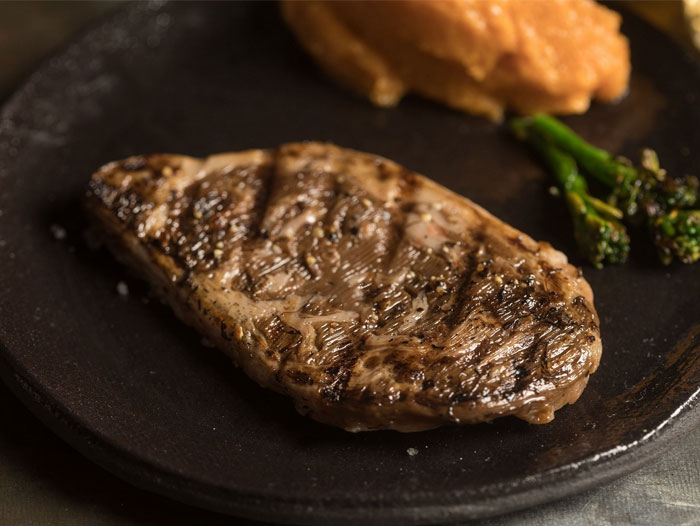Aleph Farms and The Technion Reveal World’s First Cultivated Ribeye Steak
February 9, 2021 | 4 min to read

REHOVOT, Israel — Aleph Farms Ltd. (the Company) and its research partner at the Faculty of Biomedical Engineering at the Technion – Israel Institute of Technology, have successfully cultivated the world’s first slaughter-free ribeye steak, using three-dimensional (3D) bioprinting technology and natural building blocks of meat – real cow cells, without genetic engineering and immortalization. With this proprietary technology developed just two short years after it unveiled the world’s first cultivated thin-cut steak in 2018 which did not utilize 3D bioprinting, the Company now has the ability to produce any type of steak and plans to expand its portfolio of quality meat products.
Unlike 3D printing technology, Aleph Farms’ 3D bioprinting technology is the printing of actual living cells that are then incubated to grow, differentiate, and interact, in order to acquire the texture and qualities of a real steak. A proprietary system, similar to the vascularization that occurs naturally in tissues, enables the perfusion of nutrients across the thicker tissue and grants the steak with the similar shape and structure of its native form as found in livestock before and during cooking.
“This breakthrough reflects an artistic expression of the scientific expertise of our team,” enthuses Didier Toubia, Co-Founder and CEO of Aleph Farms. “I am blessed to work with some of the greatest people in this industry. We recognize some consumers will crave thicker and fattier cuts of meat. This accomplishment represents our commitment to meeting our consumer’s unique preferences and taste buds, and we will continue to progressively diversify our offerings,” adds Toubia. “Additional meat designs will drive a larger impact in the mid and long term. This milestone for me marks a major leap in fulfilling our vision of leading a global food system transition toward a more sustainable, equitable and secure world.”
The cultivated ribeye steak is a thicker cut than the company’s first product – a thin-cut steak. It incorporates muscle and fat similar to its slaughtered counterpart and boasts the same organoleptic attributes of a delicious tender, juicy ribeye steak you’d buy from the butcher. “With the realization of this milestone, we have broken the barriers to introducing new levels of variety into the cultivated meat cuts we can now produce. As we look into the future of 3D bioprinting, the opportunities are endless,” says Technion Professor Shulamit Levenberg, Aleph’s Co-Founder, Chief Scientific Advisor and a major brainpower behind the company’s IP. Levenberg is considered a global leader in tissue engineering and has amassed over two decades of research in the field at the Massachusetts Institute of Technology (MIT), in the United States and at the Technion, in Israel. Levenberg is also the former Dean of the Biomedical Engineering Faculty at the Technion.
Aleph Farms’ zealous plans to diversify its offering align with its mission to create a global platform for local production, leveraging a highly scalable technology to create culinary experiences that can be adapted for the different food cultures around the world.
About the Technion – Israel Institute of Technology and the Faculty of Biomedical Engineering:
Technion – Israel Institute of Technology, consistently ranked among the world’s top science and technology research universities, is Israel’s first university. Since its founding in 1912, the institute has educated generations of engineers, architects, and scientists who have played a key role in laying the State of Israel’s infrastructure and establishing its crucial high-tech industries.
The Faculty of Biomedical Engineering at the Technion offers undergraduate and graduate programs for students interested in integrating research, development and engineering methods in all areas of medicine. The Faculty’s state-of-the-art research labs enable the acquisition of skills and practical experience in diverse fields which are at the forefront of contemporary science.
About Aleph Farms:
Aleph Farms is a food company that is paving a new way forward as a leader of the global sustainable food ecosystem, working passionately to grow delicious beef steaks from non-genetically engineered cells, isolated from a cow, using a fraction of the resources required for raising an entire animal for meat, without antibiotics and without the use of Fetal Bovine Serum (FBS). Aleph Farms was co-founded with The Kitchen Hub of the Strauss Group and with Professor Shulamit Levenberg, former Dean of the Biomedical Engineering faculty of the Technion – Israel Institute of Technology. Aleph Farms is backed by some of the world’s most innovative food producers, such as Cargill, Migros, and the Strauss Group.
The company has recently received top accolades for its contribution to the global sustainability movement from the World Economic Forum, UNESCO, Netexplo Forum, FAO and EIT Food.
